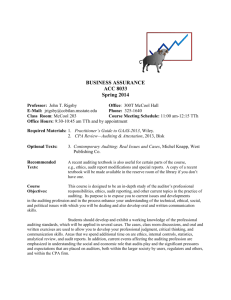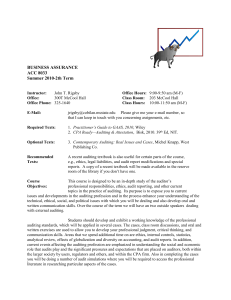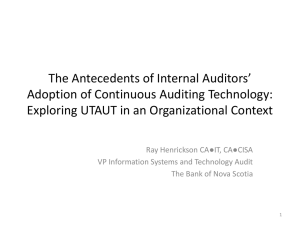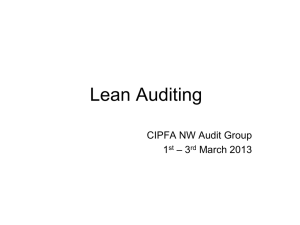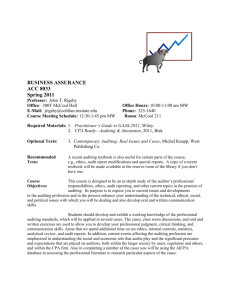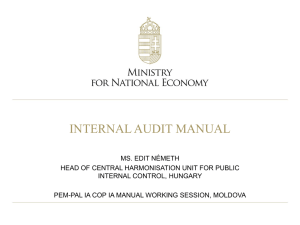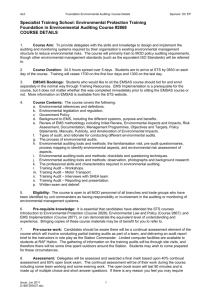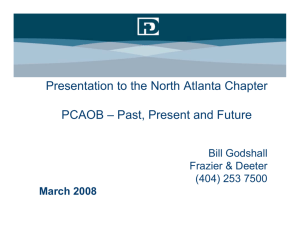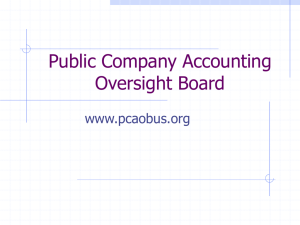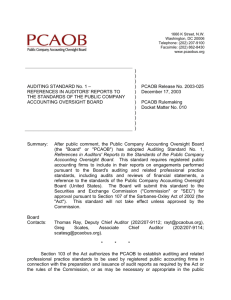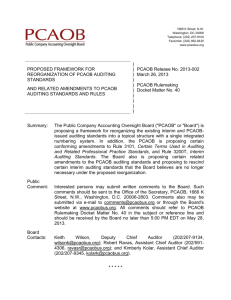Current Topic Each student is to prepare two one-page
advertisement
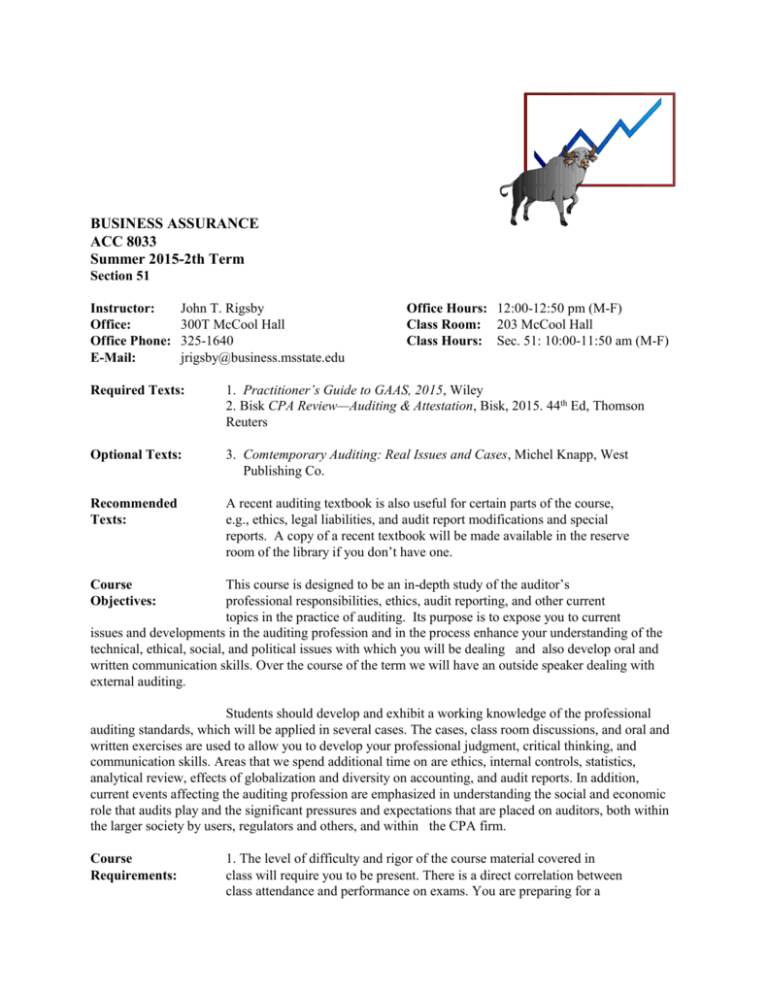
BUSINESS ASSURANCE ACC 8033 Summer 2015-2th Term Section 51 Instructor: Office: Office Phone: E-Mail: John T. Rigsby 300T McCool Hall 325-1640 jrigsby@business.msstate.edu Office Hours: 12:00-12:50 pm (M-F) Class Room: 203 McCool Hall Class Hours: Sec. 51: 10:00-11:50 am (M-F) Required Texts: 1. Practitioner’s Guide to GAAS, 2015, Wiley 2. Bisk CPA Review—Auditing & Attestation, Bisk, 2015. 44th Ed, Thomson Reuters Optional Texts: 3. Comtemporary Auditing: Real Issues and Cases, Michel Knapp, West Publishing Co. Recommended Texts: A recent auditing textbook is also useful for certain parts of the course, e.g., ethics, legal liabilities, and audit report modifications and special reports. A copy of a recent textbook will be made available in the reserve room of the library if you don’t have one. This course is designed to be an in-depth study of the auditor’s professional responsibilities, ethics, audit reporting, and other current topics in the practice of auditing. Its purpose is to expose you to current issues and developments in the auditing profession and in the process enhance your understanding of the technical, ethical, social, and political issues with which you will be dealing and also develop oral and written communication skills. Over the course of the term we will have an outside speaker dealing with external auditing. Course Objectives: Students should develop and exhibit a working knowledge of the professional auditing standards, which will be applied in several cases. The cases, class room discussions, and oral and written exercises are used to allow you to develop your professional judgment, critical thinking, and communication skills. Areas that we spend additional time on are ethics, internal controls, statistics, analytical review, effects of globalization and diversity on accounting, and audit reports. In addition, current events affecting the auditing profession are emphasized in understanding the social and economic role that audits play and the significant pressures and expectations that are placed on auditors, both within the larger society by users, regulators and others, and within the CPA firm. Course Requirements: 1. The level of difficulty and rigor of the course material covered in class will require you to be present. There is a direct correlation between class attendance and performance on exams. You are preparing for a professional career; therefore, you should view this class as a professional job assignment. Attendance is expected, especially as fast as the summer term goes! 2. A key ingredient for success is self-study. Classroom lectures and activities are designed to guide you and direct your learning experience. Much of your learning occurs outside the classroom; therefore it is your responsibility to diligently study the assigned course materials. Considerable effort on your part is required and is a long-term investment in yourself. 3. You need to apply concepts, not just memorize them, as this course is aimed at developing and internalizing a model for making audit judgments. 4. You are encouraged to work with others in your study group to go over the course material, as auditing is a process of developing judgment. The more you can verbalize the concepts, the better prepared you are for concept application. It is important to develop the professional habit of both developing your own mind and listening to and learning from those around you. You should value the views and perceptions of others and also remember that you have the right and freedom to challenge their thinking as well. Everyone should be dealt with in a professional manner. Assumptions: I am operating on the assumption that you want to gain the most you can from your studies and will therefore invest yourself in readings and assignments and come to every class prepared to engage fully. Therefore, learning is student-centered, active, integrated, cumulative, and connected. I assume you will take responsibility for your own learning and will also contribute to the learning of others. What you gain from this experience is in direct correlation to what you invest in it. You may assume that I care about your success—personally, academically, and professionally. I trust you will work to balance effectively your personal, academic, and professional commitments. I want you to gain the most possible from this experience and I am committed to my facilitator role in this venture. I want to hear your experiences, ideas, and feedback; and will hold you accountable to high academic standards. Grades: Grades will be assigned on the following basis: Activity Maximum Points Knapp Case Write-ups (4)...................................... 28 Current Topic Write-ups (2)………………….… 6 Quizzes (3)………………………………………. 45 Debate ….………….…………………………… 20 Journal (1)..…….……………………………… 5 Paper…………………………………………….. 25 Participation……………………………………… 21 Test 1……………………………..……………. 100 Test 2…………………………………………. 100 Final..................................................................... 150 TOTAL............................................................... 500 pts. The 90-80-70-60 grade scale will be used. Knapp Case Write-ups: Each student will be assigned to a team which is responsible for a typed write-up of the four Knapp cases assigned, which are due on the day the cases are to be presented. Points will be deducted for each day the case write-up is late. All team members will receive the same grade, which will be based upon whether (1) the answers address the questions asked and (2) the clearness and correctness with which ideas are presented. Current Topic Each student is to prepare two one-page summaries of current events occurring in the auditing profession or the business world. The one-page summaries are to be typed, single space, with a single blank line between paragraphs. They may discuss multiple events or a single event. Your name, the course title, and current event 1 or 2 is to be indicated on the back of the page, which is to be folded when turn in. Due dates are indicted in assignments. Quizzes We have three quizzes over the course of the summer. One is on ethics, one is on Statements on Auditing Standards, and one is on Audit Sampling. Debates: Each student is to sign up from a list of topics for a short Power Point presentation of five to seven minutes on one or another side of matters of current interest in the auditing profession., e.g., whether audit firms should be required to rotate off from their clients periodically or if SARBOX goes too far. Its purpose is to expose you to several areas of controversy and continuing change in auditing and the elements that make up a persuasive argument. The presentations will be made at the beginning of class; a pro and a con will be presented. You are to dress well when you give your presentaion but it does not have to be professionally, e.g., khakis and polo shirt is ok, shorts or tank top is not. Journal: You are to turn in a journal write-up on Tuesday of the first full week, July 14. Its purpose is for me to get to know you. It is to be one page, typed and may be emailed in if that is more convenient. Paper: Each student will be assigned to a team that is to prepare and turn in a eight to twelve page (excluding title page and reference page), single-spaced, typed (12 type) paper on some aspect of the development of the auditing profession incorporating the two Zeff articles that we covered in class and a number of other articles. All sources are to be properly referenced using the APA method. Possible points will be allocated between the development of the topic, length, references, and grammar. The due date is July 22. The paper should have an introduction, development and a conclusion. Participation Participation and attendance in class is critical to your success in this class. Exams/ Final: The exams consists of a combination of multiple-choice questions and essays/exercises. The final is comprehensive, with the material covered by the multiple choice questions equally weighted. It also includes essays/exercises on material covered since the last test. ADA Statement: If you need academic accommodations based on a disability, contact the office of Student Support Services in Room 01, Montgomery Hall (3253335) or email Julie Betty at jberry@saffairs.msstate.edu Title IX: MSU is committed to complying with Title IX, a federal law that prohibits discrimination, including violence and harassment, based on sex. This means that MSU’s educational programs and activities must be free from sex discrimination, sexual harassment, and other forms of sexual misconduct. If you or someone you know has experienced sex discrimination, sexual violence and/or harassment by any member of the University community, you are encouraged to report the conduct to MSU’s Director of Title IX/EEO Programs at 325-8124 or by e-mail to titleix@msstate.edu. Additional resources are available at http://www.msstate.edu/web/security, or at http://students.msstate.edu/sexualmisconduct/. Academic Integrity: Accounting is a profession, the basis of which is our character and integrity. Since you are training to be professionals, you are expected to act as such. Also all MSU students are to abide by the honor code of the University: “As a Mississippi State University student I will conduct myself with honor and integrity at all times. I will not lie, cheat, or steal, nor will I accept the actions of those who do.” All occurrences of academic misconduct will be handled in accordance with the Academic Misconduct Policy (www.msstate.edu/web/security.html). Cellular Phones: To avoid class disruptions, cellular phones and pagers must be placed in the mute or off mode during class. Cellular phones and pages must be turned off during all examinations and are not to be used. If I see a cell phone during a test then the exam will be confiscated and you will get zero points. Important Dates: July 7 – Last day for dropping a course without a grade. July 8 – Last day for registration or adding a course. July 24 – Last day to drop a course with a “W”. Date July Assignments Introduction Code of Professional Conduct ET 101, 102, 201, 203, 301, 302 Sarbanes-Oxley Act 7 (T) Other 8 (W) Leigh Ann Walker Code of Professional Conduct ET 501, 502, 503, 505 9(Th) “How the U.S. Accounting Profession Got Where It Is Today: Part I” –S. Zeff Subsequent Events AU 560, 570, 580, 585 Cases 13, 14 10(F) “How the U.S. Accounting Profession Got Where It Is Today: Part II” –S. Zeff Group Financial Statements AU 600, 610, 620, PCAOB 10 Case 15, 16, 39 13(M) Reporting on Financial Statements AU 700, 705, 706, PCAOB 1, 14 Case 17, 31, 43 Ethics quiz 14(T) Crazy Eddie Consistency of Financial Statements AU 708, 720, 725, 730, PCAOB 6, 17 Cases 18, 35, 46 Journal #1 due Current topic write-up 15(W) Special Purpose Frameworks AU 800, 805, 806, 810, 905, 910 Cases 19, 20 SAS quiz 16(Th) Debate1: Reporting on Application AU 915, 920, 925, 930 Cases 21, 22, 23 Current topic write-up 17(F) Debate2: Debate3: Fieldwork Standards AU 200, 210, 220, 230, 240, PCAOB 3, 7 Case 1, 2, 3, 32, 36 20(M) Test I (ETs, AU 560-930) 21(T) Kansayaku Audit Sampling AU 530 22(W) Debate 4: Debate5: Audit Sampling AU530 Speaker: Keith Winfield, Watkins, Ward & Stafford (10:50-11:50 am) 23(Th) Debate6: Debate7: Stat sampling quiz Laws and Regulations AU 250, 260, 265, 300, 315, 320, PCAOB 4, 5, 8, 9, 16 Cases 4, 5, 6, 33, 34, 37, 38, 45 24(F) Response to Assessed Risk AU 330, 402, 450, 500. 501, PCAOB 11, 12, 15 Cases 7, 8, 9, 40, 41, 44 27(M) Debate8: Debate9: External Confirmations AU 505, 510, 520, 540, 550 Cases 10, 11, 12 28(T) Test 2 (AU 200-501 and PCAOBs) 29 (W) Debate10: Debate11: Attestation Standards AT 20, 50, 101, 201, 301, 401 Case 24, 25 Paper 30(Th) Debate12: Registered Auditors, South Africa Attestation Standards AT 501, 601, 701, 801, AR 60-90 Cases 26, 27 31 (F) Compilations and Reviews AR 200, 300, 400, 600 Cases 28, 29 August 3 (M) 6(Th) Catch-up and Review Final Exam (8-11 am) Note: Assignments are subject to change.

